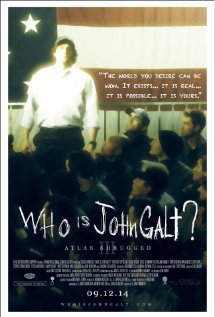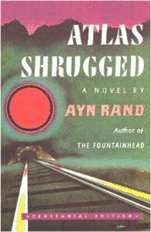Near perfect rendition of the Ayn Rand iconosphere__9.5/10
 Sure, I know what you’re thinking, I’m just like a sports’ homey praising his pedestrian quarterback for a performance that gets the job done, but lacks the glittering brilliance of the Hall of Fame QB of a bygone era. Exactly! Atlas Shrugged, Part 3, the movie’s final installment, subtitled ‘Who is John Galt?,’ is not truly a masterpiece, but it is as inspired and imaginative a treatment of the literary-philosophical giant Ayn Rand’s magnum opus as can likely be created under practical contemporary constraints of budget… or realistic access to a full spectrum of creative talent who can convincingly present the essence of what Rand stands for, on film.
Sure, I know what you’re thinking, I’m just like a sports’ homey praising his pedestrian quarterback for a performance that gets the job done, but lacks the glittering brilliance of the Hall of Fame QB of a bygone era. Exactly! Atlas Shrugged, Part 3, the movie’s final installment, subtitled ‘Who is John Galt?,’ is not truly a masterpiece, but it is as inspired and imaginative a treatment of the literary-philosophical giant Ayn Rand’s magnum opus as can likely be created under practical contemporary constraints of budget… or realistic access to a full spectrum of creative talent who can convincingly present the essence of what Rand stands for, on film.
I’ve read all—actually I’ve only read a few, but this is one situation where if you’ve read one you’ve read them all—the snide, supercilious slams by so-called film critics in and around the Hollywood bubble machine. The smarter of these focus solely on the moviemaking qualities, which they uniformly disparage, while conceding that the ideas themselves may be quite good: “Heck I even remember having a thought of my very own once that made me very proud and selfish in a good way, and I did oppose the federal government’s takeover of zoos.” In other words, the average movie critic’s worldview/psychology is so alien and hostile to Ayn Rand’s core message of heroic individualism—a hostility groomed over generations of abdication to Tinsel-Town hive-mind—that he’s like one of the apes jumping around the obelisk in 2001: A Space Odyssey, brandishing a mastodon bone.
Think of it for a moment: you are creating a world on screen where it makes perfect sense for the protagonists to embrace their own creative, indomitable spirits and speak convincingly, yet naturally, of the high-righteousness of seeking their own rational self-interests in the material world. Further, any world of rational selfishness worth its salt, they say, entails absolute political and economic freedom: life, liberty, and property. What’s mine is mine and what’s yours is yours… not, what’s mine is yours and what’s yours is mine or any other permutation. Atlas Shrugged and Ayn Rand are all about the nonaggression principle and the ‘inviolate supremacy of individual rights.’ [The Glorious Collective is merely a fiction thrown up by gangsters and their court intellectuals to mask an intent to expropriate not only material wealth of the individual, but his dreams and soul.]
Needless to say, the Glorious Collective is humankind’s biggest threat today.
 So, okay, that’s the framework. You, Mr. or Ms. producer, director, actor, musician, set designer, etc. need to make the people in this film believable and real. Guess what! Bonus time! You also have this marvelous 1000+ page book Atlas Shrugged in front of you that has already solved that problem: the heroes in the book are not only believable, they’re inspiring. They change lives, they make millions of persons want to be better in all aspects of their lives. [Atlas Shrugged is the biggest seller in history after the Bible. On a personal level, reading Atlas Shrugged and the Fountainhead in 1967, my senior year in high school, catalyzed my life into a personal mission for liberty—with a conviction that who I am and the cause I love are of the highest value, ‘the stuff that dreams are made of.’ As many, I revere these ideas. I’m living proof of their efficacy.]
So, okay, that’s the framework. You, Mr. or Ms. producer, director, actor, musician, set designer, etc. need to make the people in this film believable and real. Guess what! Bonus time! You also have this marvelous 1000+ page book Atlas Shrugged in front of you that has already solved that problem: the heroes in the book are not only believable, they’re inspiring. They change lives, they make millions of persons want to be better in all aspects of their lives. [Atlas Shrugged is the biggest seller in history after the Bible. On a personal level, reading Atlas Shrugged and the Fountainhead in 1967, my senior year in high school, catalyzed my life into a personal mission for liberty—with a conviction that who I am and the cause I love are of the highest value, ‘the stuff that dreams are made of.’ As many, I revere these ideas. I’m living proof of their efficacy.]
Get it? To make the story of Atlas Shrugged convincing and compelling is not easy. In a way it’s like recreating the magic of a love affair, an impossibility. And the principals behind the AS movie effort acknowledge as much. Still with dedication and intelligence one can remain true to the source and thus create a new, yet consistent magic in the different medium. That’s why I state unequivocally that the movie Atlas, esp. III, is ‘the best it can be.’ Sure, if they had had a visionary director and a producer with a blank check, it could have made it into masterpiece territory… but for a few key reasons, those two conditions were never going to materialize in objective reality for this film.
Some impressions/opinions:
- The casting of the lead characters, John Galt and Dagny Taggart (Kristoffer Polaha and Laura Regan), is solid—it takes some getting used to, but they grow on you, especially as their dialog flows smartly at the director’s desired steady pace.
- For all the actors—you will recognize many faces—the speaking roles are freshly accomplished, nothing hurried, yet nothing halting or stilted in the back and forth that, after all, deals with concepts an average audience has little familiarity with. [At the scene where Galt is pointing to the inscription, “I swear by my life…,” I say to my date, “Can you imagine how off-the-wall and other-worldly all this conceptual ‘word’ business would appear to most young people of our government schools?”]
- Sure they use stock footage of wrecks and explosions, etc., but it’s appropriate stock footage, typical of what anyone would see on the nightly news. The difference is, unlike the nightly news, in the context of Who is John Galt the footage has meaning and fits.
- Along the lines of stock footage, some living media-notable persons are included. This is from an email brief I sent to one of my insider distribution lists: “Remember in the movie Dirty Dancing the one blotch on an otherwise masterpiece was gratuitously attributing the ideals of Rand’s Fountainhead as befitting a woman-demeaning scoundrel. Well, ASIII plays the other side of the coin by picturing globalist-statist-warmongers Sean Hannity and Glenn Beck as solidly on the side of the individualistic vision of what John Galt is proposing. Fortunately, Ron Paul, who does belong in that vision is also given a cameo.“
- Perhaps the finest achievement of ASIII is staying on plot with the statements and ideas expressed. That Galt’s Speech was superlatively condensed from 60 dense pages of moral-philosophical manifesto into perhaps five minutes of action-oriented radio broadcast is an unparalleled achievement that I thought I’d never live to see.
- This movie is the best cast of the three. In number one, the actors for Ellis Wyatt and Hugh Akston are not suited either by age or physicality or the dialog they were obliged to perform… or how they were directed to perform it. In number two, Dagny’s character is simply too past 30-year-old prime voluptuous womanhood. Still in the context of what kind of movie this is and has to be, such personnel choices are mere quibbles.
- John Galt is the most intellectually and spiritually invigorating of the trilogy, it really digs deeply into the young of heart by emanating the most hopeful and clarified vision of how you, individually, can reach for the stars. How the creative mind can free itself from the stupefying, stultifying Collective that we ‘different ones’ are flooded with daily… to the point of nausea.
- Hey, for all you Eddie Willers fans: I shouldn’t really add this because it’s a bit of a spoiler, so skip to the next paragraph if you don’t want to be spoiled. But guess what! In the movie, unlike the book, the heroes ‘go back for Eddie Willers.’ He gets in! That is, into Galt’s Gulch in preparation for the return, along with all the superminded demigods. Is that because in the movie, Eddie (for some mystifying reason) is black? Talk amongst yourselves.
Final Comments
Point #7 brings these final comments to mind. Also that, as I mention in point #4, Sean Hannity and Glenn Beck are allowed a moment of reflected John-Galt-productive-dynamo glory by the producers and writers. This is a disturbing inclusion. To many modern Objectivists (true believers in the Randian philosophy, lock, stock, and barrel), talking heads epitomized by Hannity and Beck—both of them neocon-and-US-war-machine über pompom boys extraordinaire—are right up there as worthy knights of the Queen Goddess herself. Fortunately, the filmmakers give antiwar Ron Paul the same billing, and Ron Paul captures the true essence and direction of what Rand’s artistic vision was truly about.
The sad fact is that Rand’s nonfiction life, her orchestration of the Objectivist movement, was intellectually authoritarian and she became an extreme cheerleader for the American Behemoth imperial corporate-warlord state and a staunch Zionist-Israeli supremacist who characterized the Palestinians—she said the same thing about the American Indians—as nothing but savages who deserved all the ethnic cleansing they got. So to the ‘Bad Rand’ nonfiction self, American imperialists like Hannity and Beck are perfectly aligned. But to the ‘Good Rand’ fictional creative individualist, the Ron Paul Constitutional freedom and Gandhian truth philosophy (Satyagraha) partisans are the proper expression.
Since Ayn Rand’s death in 1983, the organizations who call themselves Objectivist—even the more tolerant ones headed by the likes of David Kelley—have mostly been stridently ‘Bad Rand.’ With everything that implies… to use one of her favorite expressions. Which means modern Objectivism as a spiritually or even politically liberating philosophy is a dead end. All the ‘Good Randians’ are out leading the truth, justice, and freedom movements toward the New Paradigm… far, far away from the corporatist US superstate that the ‘Bad Randians’ are happy to consign us to. The ‘Good Randians’ are also vanguards in the realm of practical (and theoretical) philosophy, along the lines of the Thrive movement, truly propelling the human race forward as a billion points of light.
‘nuf said. The Atlas Shrugged trilogy itself (especially this third installment), as well as the book, are Good Rand all the way, and remind the young idealist in all of us just how wonderful life can be. Exhilarating.
One Final Note
For those ‘Good Randians’ who are moving the cause forward, the Atlas Shrugged movies rekindle so many lines of reasoning from back in the day. We see her preoccupation(s) with altruism vs. egoism, and we tend to have new observations and insights on how her resolution of such conflicts leads to a flowering of even more salutary ideas. In other words, ASIII tends to bring back the joy of discussing and exploring healthful notions for our worldview and our world. Obviously, to get into these new lines of thought can keep us up all night, and qua movie review this isn’t the time or the place; just be forewarned of the potential intellectual energy unleashed by AS revisited.:)
This post has been read 10227 times!



Great review – right on the money!!